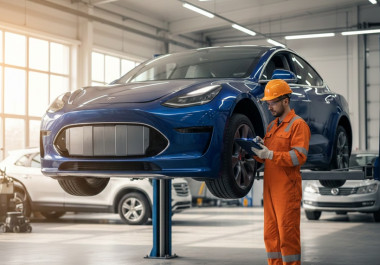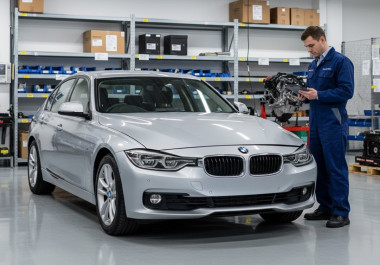Buying at auction can be exciting, whether you’re in a crowded hall with an auctioneer calling the bids or scrolling through listings online. The process moves quickly, but once the hammer falls, the focus shifts to something less glamorous but absolutely essential: paperwork. Without the right documents, you could face delays, unexpected costs, or even legal problems.
This guide explains the paperwork you’ll need when buying a car at auction in the UK. From identification at registration to the V5C logbook, MOT certificates, and finance checks, each piece of documentation plays a part in protecting your investment and ensuring you drive away with confidence.
Registration and Identification
Before bidding, you’ll need to register as a participant. Auction houses, whether physical venues or online platforms, want to ensure all bidders are genuine.
-
At a physical auction, this usually means completing a registration form, showing proof of identity such as a passport or driving licence, and paying a refundable deposit.
-
On online platforms, the process often involves creating an account, linking payment details, and verifying identity.
The deposit demonstrates that you’re a serious bidder and binds you to the auction’s terms and conditions. Failing to pay for a car after winning a bid could mean losing the deposit.
Auction Catalogue and Listings
The auction catalogue is one of the first documents you’ll encounter. It includes details about each vehicle, often alongside disclaimers that explain its condition, service history, or legal status.
For example, a car may be listed as:
-
“Cat N” (previously written off due to non-structural damage).
-
“Ex-fleet” (previously part of a leasing or company fleet).
-
“No logbook present” (meaning the V5C isn’t available).
Pay close attention to these details. Overlooking them could leave you with unexpected problems, such as the cost and hassle of applying for a new logbook or repairing hidden damage.
The V5C Logbook
The V5C logbook is one of the most important documents in any car purchase. It links the vehicle to its registered keeper, and without it, transferring ownership becomes far more complicated.
-
If the V5C is present, the auction house or seller will usually help complete the transfer.
-
If it’s missing, you’ll need to apply to the DVLA using form V62, which can delay your ability to register the vehicle in your name.
A missing logbook doesn’t always signal a problem, but it does add an extra layer of risk. In such cases, some buyers choose to work with established scrap car dealers instead. Dealers handle all the paperwork, including V5C updates, which removes the uncertainty of dealing with incomplete records.
MOT Certificates
The MOT certificate proves that the car meets road safety and environmental standards. Auctions may list whether the MOT is valid, expired, or nearing expiry.
-
A vehicle with a recent MOT offers peace of mind.
-
A car without a valid MOT means you’ll need to arrange transport to get it home legally.
Holding on to any MOT records you receive is crucial. They help establish a car’s condition, reveal recurring issues, and support resale value later.
Service Records and Maintenance History
Service records provide evidence of how a car has been maintained. While not always available at auction, they’re valuable when they are. Records might include:
-
Stamped service booklets.
-
Invoices for routine maintenance.
-
Receipts for major repairs, such as timing belt changes.
If service history is missing or incomplete, consider running an HPI check to confirm mileage and verify whether the vehicle has been written off. A lack of paperwork isn’t necessarily a deal-breaker, but it should factor into your decision.
HPI Checks and Finance Records
One of the most serious risks at auction is buying a car with outstanding finance. If you unknowingly purchase such a vehicle, the finance company could repossess it.
Auction houses may provide reassurance by stating that a car is “HPI clear,” but it’s wise to perform your own check. An HPI report can confirm:
-
Whether the car has outstanding finance.
-
If it’s stolen or written off.
-
Mileage discrepancies.
Keeping a copy of your HPI report is just as important as the MOT certificate or V5C logbook. It serves as proof that you checked the vehicle’s status before purchase.
Proof of Purchase and Invoices
Once the hammer falls, the auction house will provide an invoice or proof of purchase. This document confirms:
-
The winning bid price.
-
Any additional fees, such as buyer’s premiums or administration costs.
-
Specifics included in the sale (for example, spare keys or accessories).
Always review the invoice before leaving. If the listing mentioned two keys but only one is handed over, it’s easier to resolve immediately.
Insurance and Road Tax
Insurance and taxes aren’t auction documents, but they become your responsibility as soon as you take ownership.
-
Insurance: Without cover, you can’t drive the car home. Some insurers are cautious about salvage vehicles (e.g., Cat S or Cat N), so always check the availability of cover before bidding.
-
Road tax: Cars sold at auction are rarely taxed. You’ll need to arrange this online before using the vehicle on public roads.
Where cars fail MOT tests or are marked as non-runners, some buyers opt for car recycling services instead. Recycling ensures vehicles that are unsafe for the road are responsibly dismantled, avoiding legal or financial risk.
Export and Import Considerations
If the vehicle is imported, exported, or intended for overseas use, expect extra paperwork. You may need:
-
Proof of customs clearance.
-
Additional compliance certificates for foreign registration.
-
Confirmation that no duties are outstanding.
These documents are particularly important when buying cars originally registered outside the UK or when shipping vehicles abroad.
Common Pitfalls with Auction Paperwork
Car auctions move quickly, which can lead to rushed decisions. Buyers sometimes overlook key paperwork because the excitement of the bidding process takes over. Typical mistakes include:
-
Ignoring warnings about missing logbooks.
-
Assuming service histories are complete without checking.
-
Forgetting to confirm MOT validity.
-
Not verifying whether outstanding finance exists.
In cases where paperwork is incomplete or concerns arise, requesting a free scrap car quote can be a safer option. This route provides transparency, with no hidden obligations or missing documents.
Practical Steps to Keep Paperwork in Order
-
Read all disclaimers in auction listings carefully.
-
Verify the V5C logbook or apply for one promptly if missing.
Check MOT status and plan transport if the car isn’t roadworthy. -
Ask for service records or invoices where available.
Run an HPI check to confirm finance and history. -
File your invoice safely for future proof of purchase.
-
Arrange insurance and tax before attempting to drive away.
Closing Thoughts
Paperwork may not be the most exciting part of buying at auction, but it’s what turns a winning bid into secure, legal ownership. From the V5C logbook and MOT certificate to HPI checks and invoices, each document plays a role in protecting both your wallet and your peace of mind.
When paperwork is complete, buying at auction can be a straightforward way to secure a vehicle at a fair price. When it’s missing or unclear, the risks increase. By staying alert and organised, buyers can enjoy the thrill of the auction while avoiding the common traps that catch out the unprepared.




